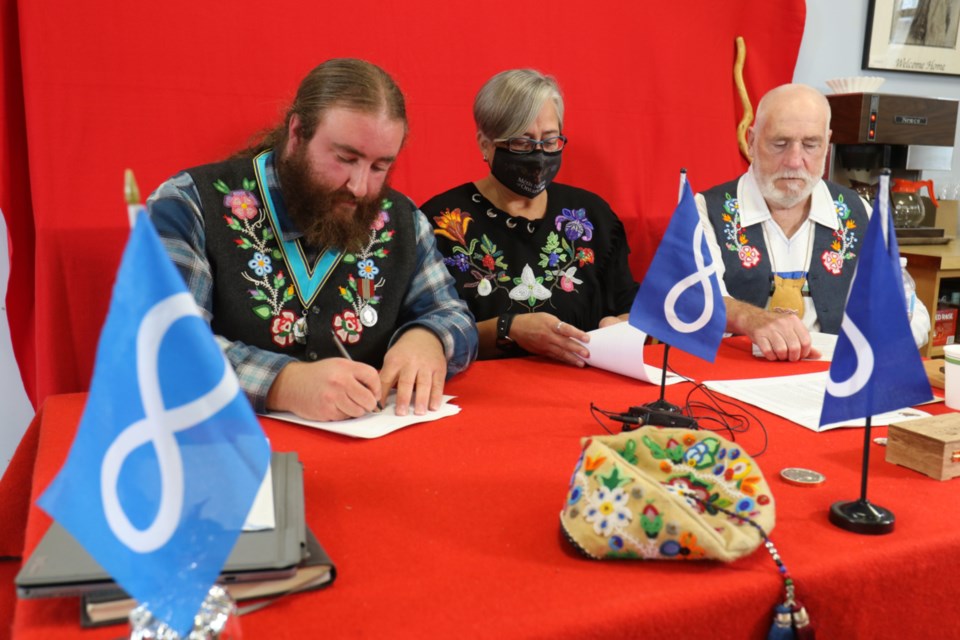Métis Nation of Ontario Region 4 Councillor Mitch Case will be part of a delegation representing the Métis National Council, Assembly of First Nations and Inuit Tapiriit Kanatami that will travel to the Vatican to meet with Pope Francis to discuss the impact of residential schools.
The delegation of First Nations, Métis and Inuit representatives will depart for Rome March 26.
Case, a Métis citizen from the Historic Sault Ste. Marie Métis Community, hopes the journey to the Vatican will eventually lead to an official apology from the Pope to survivors for the Catholic church’s role in Canada’s residential school system.
“I think an apology from the Pope would be really meaningful for them,” said Case, speaking with SooToday Thursday. “I’m hoping he doesn’t do an apology while we’re there — I’m hoping he’ll come to Canada and do an apology here where more survivors can be in attendance, rather than the limited numbers that are going to Rome.”
The delegation has also requested meetings with other church officials at the Vatican, including archivists and the Congregation for the Doctrine of the Faith, in order to discuss the release of residential school records.
On Tuesday, The Missionary Oblates of Mary Immaculate — a Catholic religious order responsible for the operation of 48 residential schools in Canada — agreed to grant the Winnipeg-based National Centre for Truth and Reconciliation full access to records in Rome.
Case said the delegation will also speak with the Congregation for Catholic Education about bringing more education on the residential school system to Catholic school boards in Canada.
“We think they should be doing more to tell the history and the story of residential schools and the church’s role there,” he said.
Members of Case’s family attended a number of residential schools, including Shingwauk Indian Residential School and St. Joseph’s Residential School in Spanish, Ont.
He said that a number of Métis residential school survivors were left off of the Indian Residential School Settlement Agreement because the schools they attended were funded by either the church or the provincial government, not the federal government.
“Those schools were not put on the settlement agreement, so they weren’t part of the investigation, they weren’t part of the TRC [Truth and Reconciliation Commission of Canada]. Those schools also need to be looked at,” Case said.
In a statement issued Tuesday, the Métis National Council reiterated the need for reparations from the church.
“Grounded in the stories of our Métis survivors, families and communities, delegates will convey the deep, lasting intergenerational trauma that residential schools inflicted upon the Métis Nation, as well as the need for the Church to provide reparations to the Métis Nation, including financial support for community-led healing and community rebuilding initiatives,” the release said.
The Métis National Council will send a delegation of eight people to the Vatican, including three residential school survivors who attended schools in Saskatchewan and the Northwest Territories. The Métis delegation meets with Pope Francis March 28.
“The Pope has written about the Catholic principle of confession, and he says that confession cleans the sinner’s soul, but it does nothing for the victim. But in many ways, confession hasn’t even happened, right? The church has never issued an official apology, and in many ways, had to be dragged into the settlement agreement by the courts,” said Case. “Just the ongoing denial or indifference, it re-traumatizes people, and it causes more harm.
“I’d really like to see them begin a process of taking more responsibility. That is, I think, the biggest thing.”
Case said that his role in Rome will be akin to the honorary witnesses who sat and listened to accounts from residential school survivors at the Truth and Reconciliation Commission.
“As a relatively young member of the delegation, I have a responsibility to go there and listen to what those survivors say, and carry that message back home,” he said.
More than 150,000 children attended residential schools in Canada over a period spanning more than 150 years, according to the Truth and Reconciliation Commission of Canada.
- with files from The Canadian Press
